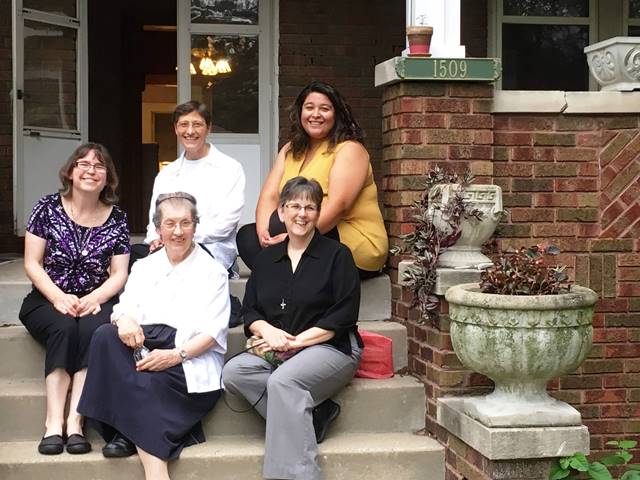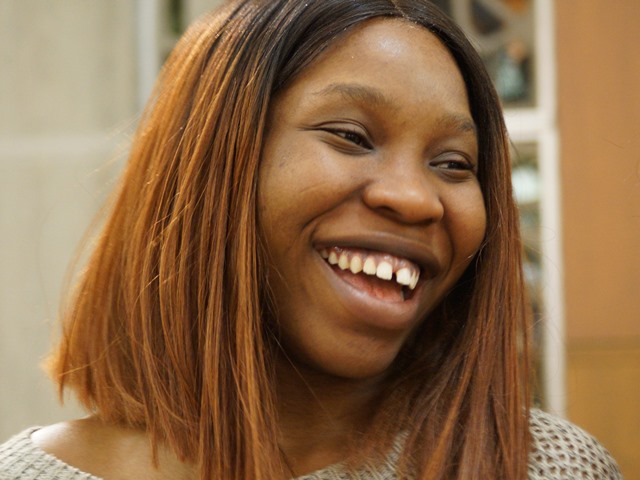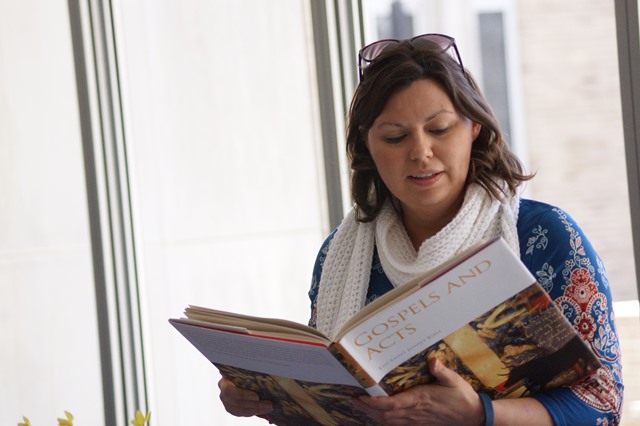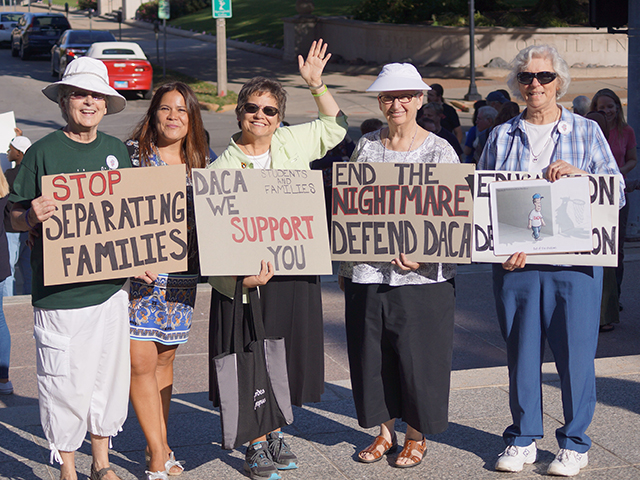In preparation for our upcoming General Chapter, we invited some of our sisters, friends, and associates to talk about how they see the sisters following the Spirit’s lead into the future. The Winter 2019 issue of JUST Words pulled their thoughts together, but there was more good stuff than we could include in the print version of the magazine. This one includes much more than Dominican Sisters’ Role: Building Relationships in a Disconnected World, that appeared on pp. 8-9 of JUST Words, vol. 19, no. 1. Here we share our conversations with three young professionals about their needs and desires for the world, and for future ministry of the Springfield Dominican Sisters.

Rocio Hurtado
Rocio is an Illinois Department of Public Health employee, who relocated to Springfield from her home in Cicero, Ill. She and her mother share a home on the North End, and Rocio has recently begun to welcome foster children.
True religion
Rocio starts with a caveat. She is not enamored of organized religion. In her experience churches create “separation, resentment, and depression.”
“I’ve stepped away from organized religion because people spend too much time in church,” she says. “I don’t identify with any faith tradition. To me, faith comes down to two passages of scripture: ‘The first will be last and the last will be first’ in the gospel, and from James—I think—‘true religion is to care for orphans and widows.’”
When asked how she thinks the Spirit is calling the Springfield Dominican Sisters to live those texts, Rocio’s thoughts turned immediately to what she calls our “carpenter’s house”—the place where we live and where she first encountered us—Springfield.
“I think of the east side of Springfield, which is socially and economically under-resourced,” she said.
“Do you know St. Martin’s?” she asks.
Rocio means St. Martin DePorres Center on Springfield’s east side, a food and clothing distribution facility founded decades ago by our own Sister M. Dominic Joerger.
“Any kind of work there would be great,” she says, suggesting that we organize a work day there to spruce up the place. “A sweep and scrub” as she called it, would go a long way toward honoring the human dignity of those who rely on St. Martin’s for food and clothing.
Then Rocio launches enthusiastically into a description of a program she knows from her life in Chicago. Lawndale Christian Health Center on the city’s westside, operates a Federally qualified health clinic for the neighborhood. They also partner with the Chicago Botanic Gardens on a community garden center that provides fresh vegetables in one of Chicago’s food deserts.
U.S.-born of Mexican heritage, Rocio was happy to participate in a Lawndale program that provided “vegetable prescriptions”—on the premise that healthy food is the best medicine. The program gave participants fresh vegetables and taught them how to prepare them. “This is not a part of my culture. I learned a lot through the program,” she said.
All of this to demonstrate what she believes is an important call for the Dominican Sisters: “Do visible work in the community. Your sisters could live in the communities that need the most work. Community is a valuable witness in these neighborhoods.”
Live in the real world
“Almost nothing happens in the real world anymore,” Rocio says, exasperated.
What does she mean?
“Everything happens online,” she groans. “Our relationships are through social media, even dating happens online. The organic development of relationships doesn’t exist anymore,” she says—with reason. It can seem that way.
“Every time I’ve moved the only way I’ve met people is online. You don’t just go up to someone at a place to build relationships. The Dominican Sisters are creating spaces in which we can build relationships. That is valuable.”
“Do what you do best, which is to build relationships.”
Rocio and a handful of our sisters recently had a delightful and unexpected experience of relationship-building. SHE was the catalyst, in fact!
Earlier that week Rocio “accidentally” attended a gathering at the motherhouse. [There are no accidents!] The sisters in the Formation community were hosting a group of women who enjoy praying the rosary in one another’s homes during the weeks before the Feast of Our Lady of Guadalupe. Rocio had been invited to join us for dinner the following week, but a calendar mishap brought her to our door that night, friend in tow. Though neither Rocio nor her friend are Catholic, they enjoyed praying with the sisters and our guests. Before the two of them left they’d exchanged contact information with another unexpected visitor, a friend of the Dominican Sisters at St. Benedict the African Parish in Chicago, in town on business, who stopped to say hello.
This kind of relationship-building is the heart of the matter for Cor Unum, the Dominican Sisters’ new ministry with young adult women. Learn more here.
No end to the ideas
Rocio is keenly aware of the needs of the world and had plenty of ideas for the Dominicans, including:
- Cut-rate housing for potential foster parents who might then be willing to take in the 400,000 foster children in the US without homes.
- A monument to recognize the Trail of Tears and the history of the Potawatomi Tribe
- Anything we can do to “break the link between capitalism and colonialism.”
She may be on to something.

Marie Owumi
Marie first met our sisters on a Busy Persons Retreat at Illinois College, Jacksonville, Ill., where she studies business and communication. She was a senior approaching her final semester when she agreed to take a break from final exam prep to talk about what she thinks the world needs from Catholic sisters. Her family is from Nigeria and most of them are still there, though she has relatives in New York. She is working her way through college as marketing director for the campus food service and is president of the Newman Club this year. She values Catholic Education, having been Jesuit-trained in Nigeria.
“Everybody needs a little direction.”
This is how Marie begins the conversation. “The world we live in makes it harder for Christians, especially the youth to focus on God. Young people need help finding a safe place to talk about God.”
What makes a place safe?
“Trust,” she says.
“One of the major stereotypes is that sisters will judge me for what I am about to say. We need a ‘no judgement zone’ a place where there are no expectations put on us.”
Normal People
Then, as if to soften her words she says “Be yourself! You guys are awesome. And you need to have a more public face.”
“Not marketing sisters as such,” says the marketing student, “but showing the world that you are normal people, too.”
Then she mentions “That sister who threw the pitch…that was just amazing in its own right.”
Her friends noticed, she said. “Hey! It was a sister!” She believes a public event like that sends a signal: “We’re normal people, we do normal things. You can talk to us.”
A helping hand
Marie’s next intuition may seem odd at first, but it is not uncommon for sisters to advocate to counter the impact of a globalized economy on the lives the people who are marginalized in our society. Marie suggests we support initiatives for “people trying to make it in the world” and by that she meant small business entrepreneurs. “Give them a helping hand. They need the most support because big conglomerates drown out small businesses.
“Make the world a safer space for more people to do what they want to do without bending to the will of capitalism.” It was this message that got Dr. Martin Luther King, Jr., assassinated 50 years ago, a message being revived for the 21st Century.
“You can start wherever you are already working, whatever you are already doing,” she says in her practical way, “in your schools and small offices, inspiring people to go for their dreams.”
Media impact
Economics is not her only concern, says this business-communications major. “The media has tunnel vision and we listen to the media. It’s difficult in this environment to distinguish between truth and fiction,” she said, asking the sisters to use their moral authority to help people make those distinctions.
A secular time
What does Marie think about the fact that few women are choosing religious life these days?
“There will be a resurgence of religious life, but I don’t know how soon it will be,” she admits. Then, thinking out loud, she says, “The world is in a secular time. These past couple of decades people have wanted to express their freedom without criticism. The next couple of years are exploratory times for the whole world.
“I don’t want sisters to die out; it will be a shame, but I don’t know when we will see a resurgence.”
She does not think the problem lies strictly with Catholic sisters or Catholicism alone. “The world needs open-mindedness among every one of every faith,” she says.
Then she gets serious and explains that she knows so many people who identify as LGBTQ who have turned away from the church because they felt they were unwelcome there.
“The last time I was home in Nigeria the priest preached against LGBTQ people,” she said, crestfallen and incredulous. “It’s 2018!”
“When people start seeing that faith is open to everyone then we will see more people coming.”

Erica Smith
Erica is a Springfield Dominican associate and executive director of Helping Hands of Springfield, a shelter founded in 1989. She responded in writing to the question “How is the Spirit calling the Dominican Sisters forward into the future?” Here is her response in full:
Be where Jesus would be
I am answering this question from the privilege of working daily with people who are homeless. So the first answer I would suggest is that the Spirit calls us to be where Jesus would be if He still walked the Earth as a human being. And when I think of the suffering, and the pain, and the strength, and the grace I see every day in those who are homeless, I'm pretty sure Jesus would spend a lot of his time at a shelter or a day center. In fact, I'm convinced He does come through our doors several times a day.
Heal, don’t fix
I also believe Jesus would want us to be trauma-informed, which is exactly what he demonstrated in many of his encounters with people who are broken by life—the woman about to be stoned; the crippled man on the mat. Jesus healed people; he didn't fix them. And He did that by loving them first and always. If you want to serve the homeless, love them. Because when you come to know their stories, you see their poverty is not for lack of things but often for lack of respect and love. How do you love them? By having the courage to be with them as they are, forgoing our need to hand out charity or reform them. As one of my mentors once told me when walking with people in challenging times: "Don't just do something. Stand there."
The burden of [white] privilege
Speaking of standing with others, Catholic social justice calls all of us to have a preferential option for the poor and for me that asks: How can we build a society that is just? Poverty and homelessness are a collective decision made by the economic, social, and political systems we all participate in. The burden of change is not on those already pushed down; it is upon us who have had the safety net of privileged race, socioeconomic status, and opportunity hoisting us up all our lives. As we walk through life, we must have the courage and humility to acknowledge this injustice, and to lift up others around us.
Repeating back
So much of this I can write because I learned it from the Dominican and Franciscan Sisters, so I really feel I'm only repeating back what has been taught to me by the Sisters and priests who have enriched my life.


